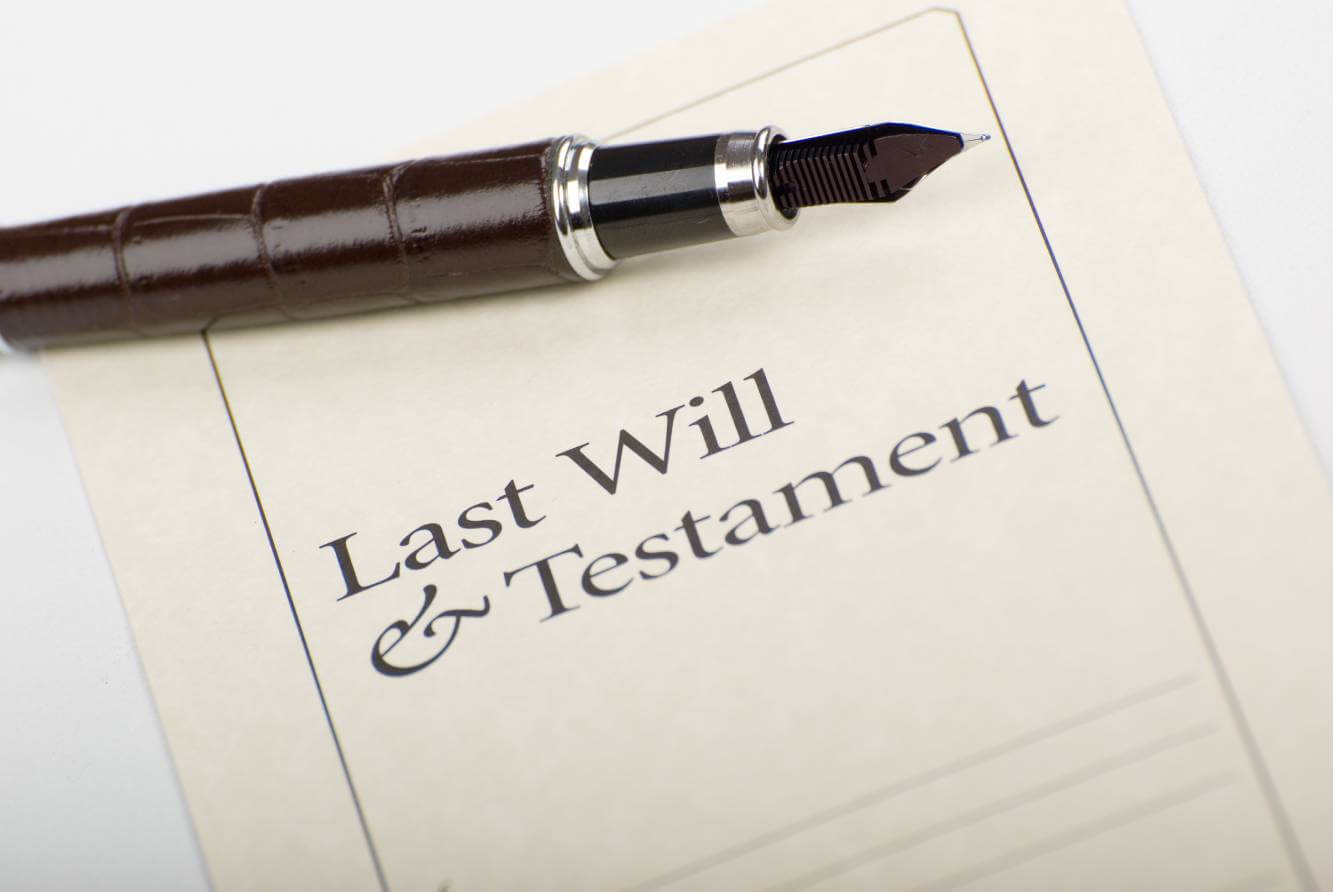10 Reasons You Need a Will

Editor's note: This post was originally published March 11, 2022, and has been updated for accuracy, comprehensiveness and freshness on July 31, 2023, and August 11, 2025.
After a long day, you'd probably rather kick up your feet and watch TV than discuss what will happen if your cat Meatball outlives you. No one likes talking about Wills because no one likes thinking about death—and we don't blame you.
However, this mindset has led many people to fail to create one of the most important legal documents they'll ever need. Why you need a Will isn't just about wealth—it's about protecting your family, your wishes, and your legacy.
Whether you're 25 or 75, wealthy or just starting out, the importance of a Will cannot be overstated. To help you make the best decisions while creating or updating your Will, we’ve laid out 10 reasons to make a Will. We’ll also explain why waiting isn't a good option.

What does a Will do?
Simply put, a Will ensures that your wishes are honored after your passing. A Will, also called a Last Will and Testament, is a legal paper that lets someone say what should happen to their estate after they die. It helps make sure their money, property, and belongings go to the people they choose. A Will can also name someone to take care of their kids if they are still minors and pick a person to handle everything during the legal process. A Will helps make sure things are taken care of the way the person wants.
The purpose of a Will extends far beyond just distributing assets. It provides legal clarity during an emotional time, helps prevent family disputes, and protects the people and causes you care about most.
Here's what a Will accomplishes:
- Directs estate asset distribution according to your specific wishes
- Names guardians for minor children
- Helps prevent costly court battles between family members
- Designates an executor to handle your estate
- Provides for pets and charitable causes
- Protects unmarried partners who might otherwise receive nothing
Without a Will, you're essentially letting the state decide what happens to everything you've worked for throughout your life.
Why is it important to have a Will?
Having a Will is super important if you want to make sure your wishes are respected after you're gone. It lets you decide who gets your assets, who should look after your kids if they’re still minors, and who will be in charge of handling everything. Without a Will, the state steps in and makes those decisions for you, which might not match what you would have wanted. Creating a Will gives you control and peace of mind about what happens to everything and everyone you care about.
The importance of having a Will becomes crystal clear when you consider the alternative:
- Your estate may go to distant relatives instead of close friends or chosen family.
- Minor children's guardianship is decided by courts, not you.
- Family disputes can tear relationships apart during grief.
- Lengthy probate processes can drain your estate's value.
- Charitable causes you cared about receive nothing.
Creating a Will puts you back in the driver's seat, ensuring your values and wishes guide what happens after you're gone.
10 reasons why you need a Will
Understanding why to make a Will starts with recognizing the tangible benefits it provides. Here are 10 reasons to make a Will that apply to nearly everyone.
1. You decide who inherits your estate assets
Who should have a Will? Anyone who owns anything of value—and that includes more than you might think.
Your estate assets can include more than just bank accounts and real estate. They can include:
- Personal belongings with sentimental value
- Digital assets like photos, social media accounts, and cryptocurrency
- Business interests or intellectual property
- Vehicles, jewelry, and collectibles
A Will lets you specify exactly who receives what, preventing confusion and ensuring meaningful items go to the right people. Without one, state intestacy laws determine distribution based on family relationships alone—not your personal connections or wishes.

2. Name a guardian for minor children
If you're a parent asking, "Should I have a Will?" the answer is an emphatic yes. Naming a guardian for your minor children is one of the most critical decisions you'll make.
Without a Will, courts decide who raises your children based on state laws and available relatives. This person might not share your values or parenting philosophy, or even know your children well.
Your Will allows you to:
- Choose someone you trust completely to raise your children.
- Provide guidance on religious, educational, and lifestyle preferences.
- Name alternate guardians in case your first choice cannot serve.
- Separate guardianship roles (personal care vs. financial management) if desired.
This decision gives you peace of mind and protects your children's future.
3. Helps prevent family disputes
Family conflicts over inheritance can destroy relationships and drain estates through lengthy legal battles. The importance of a Will becomes evident when you consider how clear instructions can help prevent disputes.
Common sources of family conflict include:
- Disagreements over sentimental items like jewelry or family heirlooms
- Assumptions about inheritance that don't match reality
- Disputes between spouses and adult children from previous relationships
- Questions about final wishes when nothing is documented
A properly drafted Will eliminates ambiguity by clearly stating your intentions. This protects your family from unnecessary stress during an already difficult time.

4. Avoid intestate succession laws
Why a Will matters becomes clear when you understand intestate succession laws. These state-mandated distribution rules rarely align with personal wishes.
Typical intestate succession might result in:
- Surviving spouses receiving only a portion of the estate, with the rest going to children
- Adult children from previous marriages inheriting instead of current spouses
- Distant relatives receiving assets while close friends get nothing
- State ownership of estate assets when there are no heirs
Creating a Will ensures your choices take precedence over generic state laws.
5. Make gifts to charity
Many people want to support causes they care about, but without a Will, charitable organizations receive nothing from your estate.
Charitable giving through your Will offers several advantages:
- Tax benefits that can reduce estate taxes
- Flexible options like specific dollar amounts or percentages
- Memorial opportunities to honor your values and beliefs
- Lasting impact that continues your philanthropic legacy
Whether it's your local animal shelter, religious organization, or educational institution, a Will ensures your favorite causes benefit from your generosity.
6. Choose an executor you trust
An executor handles the practical aspects of settling your estate, from paying debts to distributing assets. The purpose of a Will includes naming someone you trust for this important role.
Without your designation, courts appoint an administrator—often the closest relative, regardless of their qualifications or relationship with you.
Your chosen executor should be:
- Organized and detail-oriented to handle complex paperwork
- Trustworthy and honest with financial matters
- Available and willing to dedicate necessary time
- Good with people to communicate with beneficiaries
You can also name alternate executors and provide compensation for their services.

7. Protect unmarried partners or friends
State intestacy laws typically recognize only legal family relationships, meaning unmarried partners and close friends often receive nothing from an estate.
A Will allows you to provide for:
- Life partners who aren't legally married
- Close friends who feel like family
- Caregivers who provided support during illness
- Stepchildren without formal adoption
This protection is especially important for non-traditional families and long-term relationships that lack legal recognition.
8. Provide for pets
Why you need a Will extends to your four-legged family members too. Pets can't inherit property directly, but your Will can ensure pets are cared for properly.
Options for pet care include:
- Naming a trusted caretaker who loves your pets
- Setting aside funds for veterinary care and daily expenses
- Creating a pet trust for more complex situations
- Providing detailed care instructions about diet, medical needs, and preferences
Without these provisions, your pets might end up in shelters or with people who can't properly care for them.
9. Reduce stress for loved ones
Losing someone you love is already overwhelming. The importance of a Will includes making this difficult time easier for your family.
A clear, comprehensive Will:
- Eliminates guesswork about your wishes
- Can help the probate process with clear instructions
- Reduces legal complications and associated costs
- Provides emotional comfort knowing they're following your wishes
Your family can focus on grieving and healing rather than making difficult decisions without guidance.
10. Start building an estate plan
A Will is typically the first step in comprehensive estate planning. Understanding what a Will do helps you recognize when additional planning tools might be beneficial.
Your complete estate plan might eventually include:
- Trusts to avoid probate or minimize taxes
- Powers of Attorney for financial and medical decisions
- Advance directives for end-of-life care preferences
- Life insurance and retirement account beneficiaries
Starting with a Will creates the foundation for more sophisticated planning as your wealth and family situation evolve.

When should you make a Will?
It's a good idea to start thinking about whether a Will makes sense for you once you reach adulthood, especially as life starts to change and you begin building up savings or other assets. Even if you haven’t created one yet, it’s worth revisiting the idea as you take on more responsibilities or want to make sure certain people are cared for. Having your wishes in writing can help protect what matters most to you and offer peace of mind to your loved ones, no matter your age.
You should create a Will if you:
- Own any assets of financial or sentimental value
- Have minor children who need guardian designation
- Want to support specific charities or causes
- Have pets that require ongoing care
- Prefer specific people inherit rather than default legal relatives
At what age should you draft a Will? As soon as you turn 18 and have any assets or responsibilities to protect. Many people create their first Will when they:
- Graduate college and start working
- Get married or enter serious relationships
- Have children or adopt pets
- Buy their first home or accumulate significant assets
- Start a business or advance in their careers
Life changes also trigger Will updates. Review and revise your Will after:
- Marriage or divorce
- Birth or adoption of children
- Death of beneficiaries or executors
- Significant asset changes like home purchases or business sales
- Moving to different states with varying laws
Will vs. trust: which is better?
Both Wills and trusts serve important estate planning functions, but they work differently and offer distinct advantages.
Wills are generally simpler and less expensive to create. These are just a few of the ways that Wills can be an easier option for you:
- Wills go through probate court for validation and implementation.
- Wills become public records accessible to anyone.
- Wills take effect only after death.
- Wills cover all assets not otherwise designated.
Trusts can be more complex but offer additional benefits:
- Avoid probate for assets held in the trust.
- Maintain privacy with no public court records.
- Can take effect immediately during your lifetime.
- May provide tax advantages in certain situations.
Which is better, a Will or a trust? The answer depends on your specific situation, asset level, and goals. Many people benefit from having both—a trust for major assets and a Will to catch anything not included in the trust.
For most people starting their estate planning journey, a Will provides essential protection at an affordable cost.

How LegalShield makes estate planning accessible
Creating a Will doesn't have to be complicated or expensive. LegalShield provides access to experienced lawyers at an affordable price, with personal legal plans starting at $26.95/month when billed annually.
What LegalShield offers for estate planning:
- Lawyer-drafted Wills included in all personal legal plans
- Living Wills and Powers of Attorney at no additional cost
- Document review for existing estate planning materials (see a legal plan for number of pages)
- Consultations on estate planning questions
- Annual updates to keep documents current with life changes
- Discounted rates for additional estate planning services
Estate planning can be confusing and costly, but a legal plan from LegalShield provides consultation and assistance from a provider law firm that makes the process straightforward and affordable.
You can download and wrestle with online forms by yourself or you can pay a monthly or annual fee for a LegalShield Membership and have a provider lawyer create the documents for you. It's far less stressful.
Protect your legacy with a Will today
The importance of a Will cannot be overstated. It's one of the most important legal documents you'll ever create, yet 54% of Americans don't have a Will or trust, and those without a Will are twice as likely to feel stressed and afraid as those with Wills.
Why you need a Will comes down to control, protection, and peace of mind. Don't let state laws and court decisions determine what happens to your life's work and the people you love most.
Creating a Will provides:
- Complete control over estate distribution
- Protection for minor children and pets
- Peace of mind for you and your family
- Helps prevent costly family disputes
- Foundation for comprehensive estate planning
Tomorrow isn't guaranteed, but proper planning ensures your wishes will be honored and your loved ones will be protected.
Take action now: secure your family's future
Don't wait another day to protect what matters most. LegalShield makes estate planning simple, affordable, and stress-free.
Ready to create your Will? Join LegalShield today and get:
✅ Lawyer-drafted Will included in your membership
✅ 24/7 legal advice on covered matters
✅ Annual document updates to reflect life changes
✅ Family coverage for comprehensive protection
✅ Affordable monthly plans starting at just $26.95
_______________________________________________________________________________
Written by Elyse Dillard, Content Specialist at LegalShield. Elyse creates educational resources about legal and identity theft protection services. She works to make complex legal concepts more accessible to readers and has contributed to numerous articles on the LegalShield blog.
Pre-Paid Legal Services, Inc. ("PPLSI") provides this blog as a public service and for general information only. The information made available in this blog is meant to provide general information and is not intended to provide legal advice, render an opinion, or provide a recommendation as to a specific matter. The blog post is not a substitute for competent legal counsel from a licensed professional lawyer in the state or province where your legal issues exist, and you should seek legal counsel for your specific legal matter. All information by authors is accepted in good faith. However, PPLSI makes no representation or warranty of any kind, express or implied, regarding the accuracy, adequacy, validity, reliability, availability, or completeness of such information. The materials contained herein are not regularly updated and may not reflect the most current legal information. No person should either act or refrain from acting on the basis of anything contained on this website. Nothing on this blog is meant to, or does, create an attorney-client relationship with any reader or user. An attorney-client relationship may be formed only after the execution of an engagement letter with an attorney and after that attorney has confirmed that no conflicts of interest exist. Nothing on this website, or information contained or transmitted by this website, is intended to be an advertisement or solicitation. Information contained in the blog may be provided by authors who could be a third-party paid contributor.
PPLSI provides access to legal services offered by a network of provider law firms to PPLSI members through membership-based participation. Neither PPLSI is not a law firm, and its officers, employees or sales associates do not directly or indirectly provide legal services, representation, or advice.
Your family's future depends on the decisions you make today
Don't leave their security to chance—protect your legacy with professional legal guidance from LegalShield.
LegalShield is a trademark of Pre-Paid Legal Services, Inc. (“LegalShield”). LegalShield provides this blog as a public service and for general information only. The information made available in this blog is meant to provide general information and is not intended to provide legal advice, render an opinion, or provide a recommendation as to a specific matter. The blog post is not a substitute for competent legal counsel from a licensed professional lawyer in the state or province where your legal issues exist, and you should seek legal counsel for your specific legal matter. All information by authors is accepted in good faith. However, LegalShield makes no representation or warranty of any kind, express or implied, regarding the accuracy, adequacy, validity, reliability, availability, or completeness of such information. The materials contained herein are not regularly updated and may not reflect the most current legal information. No person should either act or refrain from acting on the basis of anything contained on this website. Nothing on this blog is meant to, or does, create an attorney-client relationship with any reader or user. An attorney-client relationship may be formed only after the execution of an engagement letter with an attorney and after that attorney has confirmed that no conflicts of interest exist. Nothing on this website, or information contained or transmitted by this website, is intended to be an advertisement or solicitation. Information contained in the blog may be provided by authors who could be a third-party paid contributor. LegalShield provides access to legal services offered by a network of provider law firms to LegalShield members through membership-based participation. LegalShield is not a law firm, and its officers, employees or sales associates do not directly or indirectly provide legal services, representation, or advice.



